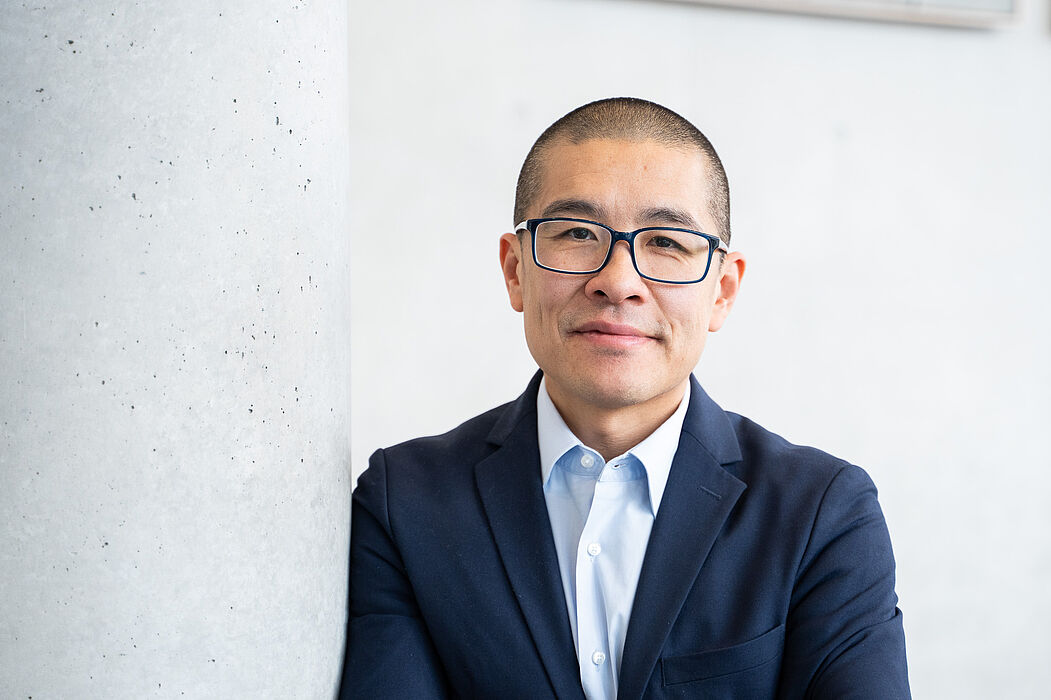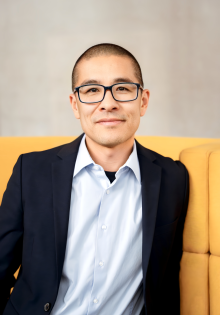Prof Dr Philip Yang, newly appointed Professor of Business Administration, in particular Sustainable Human Resource Management and Leadership, conducts research at the interface of sustainable human resource management (HRM) and leadership. In addition to research and teaching, his aim is to develop practical approaches and tools to make companies more sustainable. He gave us an insight into his interdisciplinary journey.
Philip Yang's academic career initially took him to Leibniz Universität Hannover, where he studied economics with a focus on the environment and subsequently completed his doctorate in the field of labour economics. Even during this time, he was interested in topics relating to ecological and social sustainability. In cooperation with the Deutsche Gesellschaft für Internationale Zusammenarbeit (GIZ), he wrote a thesis on the implications of fisheries certification systems for the working conditions of fishermen. As part of this thesis, he travelled around the islands of Lake Victoria with a self-recruited team of motorbike taxi drivers as interviewers to collect data. He then completed his doctorate as part of a VW Foundation project on employment issues affecting older workers. Among other things, he investigated whether and which further training measures increase the employability and productivity of older employees. After completing his doctorate, he moved to Tübingen as a junior professor, where he taught and researched in the field of corporate management, human resources and organisation. "My mentor at the time, Kerstin Pull, is an outstanding role model for me in my field of research. On the one hand, I learned a lot from her about how to deal with people in a sustainable way and how to create organisational structures in which employees can develop and feel comfortable at the same time. On the other hand, she supports me personally in every way to go my own way and pursue my research interests." Yang's fascination with the interface between sustainable HR management and leadership ultimately led her to Paderborn.
Sustainability in all dimensions
Philip Yang's research activities cover four major sub-areas that reflect his holistic understanding of sustainability: Sustainable human resource management and leadership, transformation of work, (un)ethical behaviour in companies and (leadership) diversity. He sees great potential for cooperation with the faculty of the Management Department, the Faculty of Business Administration and Economics, but above all with the Paderborn Research Centre for Sustainable Economy (PARSEC). He has already gained a lot of interdisciplinary experience in various projects and learnt about other perspectives, but the topics he is passionate about remain the same: "At the core, I'm interested in why people do or don't act in the interests of the common good," says the 42-year-old.
Common good, job boomeranging and diversity
In the more recent field of conceptualising and operationalising sustainable HR management and leadership, the new appointee makes a valuable contribution due to his background. As a member of an international research network for sustainable HRM and leadership, he is interested in understanding how companies can create sustainable corporate strategies and values in line with the Sustainable Development Goals through selection and socialisation. He is currently working on a research proposal to conceptualise and operationalise sustainable HRM and leadership in order to make these constructs measurable in the future.
In the context of the transformation of work, Philip Yang is concerned with the phenomena of new forms, structures and ways of working. His current research projects deal with the implications of agile work, multi-teaming and boomeranging, for example. Boomeranging refers to the phenomenon of employees returning to their original company after a certain period of external employment. This phenomenon is now very common, as both employees and companies recognise the great value of returning due to familiarity with the work context and existing working relationships. As part of an international research team, he is currently investigating why boomerangs can nevertheless experience integration problems and how these can be avoided.
In the field of (un)ethical behaviour, he is investigating in various projects why people in companies act unethically and how employees and managers react to this. In a recent project based on sports data and field experiments, the results show that unethical behaviour is initially even rewarded by managers and employees due to commitment perceptions and is only punished for unethical behaviour over time due to liability perceptions.
With regard to diversity, Philip Yang, for example, is trying to understand whether and how diversity in management influences the sustainability of a company. Building on studies by him and other researchers, which have shown that a higher proportion of women on the supervisory board can significantly reduce corporate risk, he and a team are currently investigating whether there are other effects in addition to economic sustainability. For example, a current project suggests that a higher gender diversity on the supervisory board has a positive effect on the social and environmental sustainability of companies, but that this effect is particularly strong in small companies due to their more flexible structures and lower visibility.
These four major focal points reflect the researcher's holistic understanding of sustainability, as he considers social and economic aspects as well as ecological ones.
Practical cooperation with Porsche
The practical relevance of research and teaching is of great importance to Philip Yang. As part of a third-party funded project on "Measuring and managing agile projects using key performance indicators", he was able to gain experience as a scientific in-house consultant at Porsche AG and thus combine research, teaching and practice in a rare way. As part of this close research collaboration between Philip Yang, doctoral candidates and students with experts from Porsche, a cockpit for measuring the degree of agility and its key performance indicators was developed. Philip Yang is particularly proud of the sound theoretical and empirical basis on which both the degree of agility and the KPIs were made quantifiable. The resulting findings have not only caused a stir in the automotive industry, but also serve Philip Yang as an example of how the university's expertise can be utilised in practice.
Bridging the gap between research and teaching as well as leisure and family
The researcher also combines his passion for his research topics with his teaching. Three aspects are particularly important to him: "My teaching must be substantial, up-to-date and application-oriented." In his lectures, Yang not only teaches basic management theories and a well-founded empirical approach. It is important to him that students also develop tools that they can take with them into practice. "In the next semester, I will be offering a course in the Master's programme in which I will contribute my experience from practical cooperation in order to teach students how they can develop scientifically sound management summaries for practical use," explains the 42-year-old. He encourages his students to bring in their personal interests and thus creates a link between research, teaching and practice: "For example, I was told that there was an interest in discrimination in the context of leadership, so I included the topic in my seminar planning," he encourages students to get involved.
As the father of four children, it was important to Philip Yang from the start of his academic career to combine family and career in one city. "My children understand better and better what I'm researching, and I can incorporate the experiences from everyday family life in Paderborn into my lectures," he says about the balance between family and career. "In our free time, we enjoy being outdoors and are enthusiastic about the many sports on offer in Paderborn.
Short and sweet
If you had an idea for a "green" office environment, what would it look like?
"For me, it's not necessarily about the office itself, but more about the outdoor area: I would like to plant trees, grow vegetables/fruit and create flower meadows to incorporate the idea of sustainability in the outdoor area as well."
Are there certain companies that you admire or that set a good example?
"A prime example is Patagonia, because they are not only very sustainable themselves, but also focus on sustainability in terms of the value chain."


